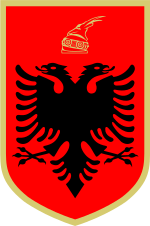Opinga
Opinga (Gheg Albanian: Apânga) are traditional shoes worn by Albanians in Albania, Kosovo, North Macedonia, Montenegro, Greece (by the Arvanites) and the Arbëresh villages of Italy.[1] It was also worn by countrymen in Romania (opinca), Serbia, Croatia, Bosnia and Herzegovina (opanak), Bulgaria (opinka) and other countries. They are made of one leather skin, formed to the feet with leather or wool strips. A southern Albanian variety of opinga are the typical turned up leather shoes with red and black wool pompoms on the ends, which are often used for folk dances.[2]
History

The earliest archaeological evidence for opinga dates back to the 5-4th centuries BC, indicating they were an element in Illyrian culture.[3][4] Later evidence of their use in Albania, comes from works of 16th century iconographic painter Onufri.[4]
It has been suggested that the etymology of the word comes from Proto-Albanian *api (modern Albanian: hapi), meaning "step".[5]
In 1610 Marino Bizzi, a Venetian patrician in Dalmatia and Archbishop of Antivari, notes that the men of Mirdita wore opinga, made of cow skin, prepared by the men themselves.[6]
The artisans of the kaza of Përmet held the monopoly in the trade of opinga in the vilayets of Shkodër and Janina until 1841, when that privilege was revoked under the Tanzimat reforms.[7]
See also
- Opanak
- Culture of Albania
- Albanian traditional clothing
- Qeleshe
- Xhamadan
References
- Studime historike. 4. Akademia e Shkencave, Instituti i Historisë. 1967. p. 123.
Po këtë tip opinge e gjejmë në përdorim edhe tek arbëreshët e Italisë
- Condra, Jill (2013). Encyclopedia of National Dress: Traditional Clothing Around the World. ABC-CLIO. p. 15. ISBN 978-0-313-37637-5.
- Andromaqi Gjergji (1988). Veshjet Shqiptare në Shekuj: Origjina Tipologjia Zhvillimi. Akademia e Shkencave të RPS të Shqipërisë, Instituti i Kulturës Popullore. p. 229.
- Ministry of Culture of Kosovo
- "Etimologji mbi fjalën ndërnacionale: "Open"". Etimologji. 2017-09-02. Archived from the original on 2017-11-25. Retrieved 2017-10-23.
- Etnografia shqiptare. Akademia e Shkencave e RPSH, Instituti i Historisë, Sektori i Etnografisë. 1976. pp. 105 and 146.
- Kristaq Prifti, ed. (2002). History of the Albanian people II 1830-1912. Academy of Sciences of Albania. pp. 45–6.
